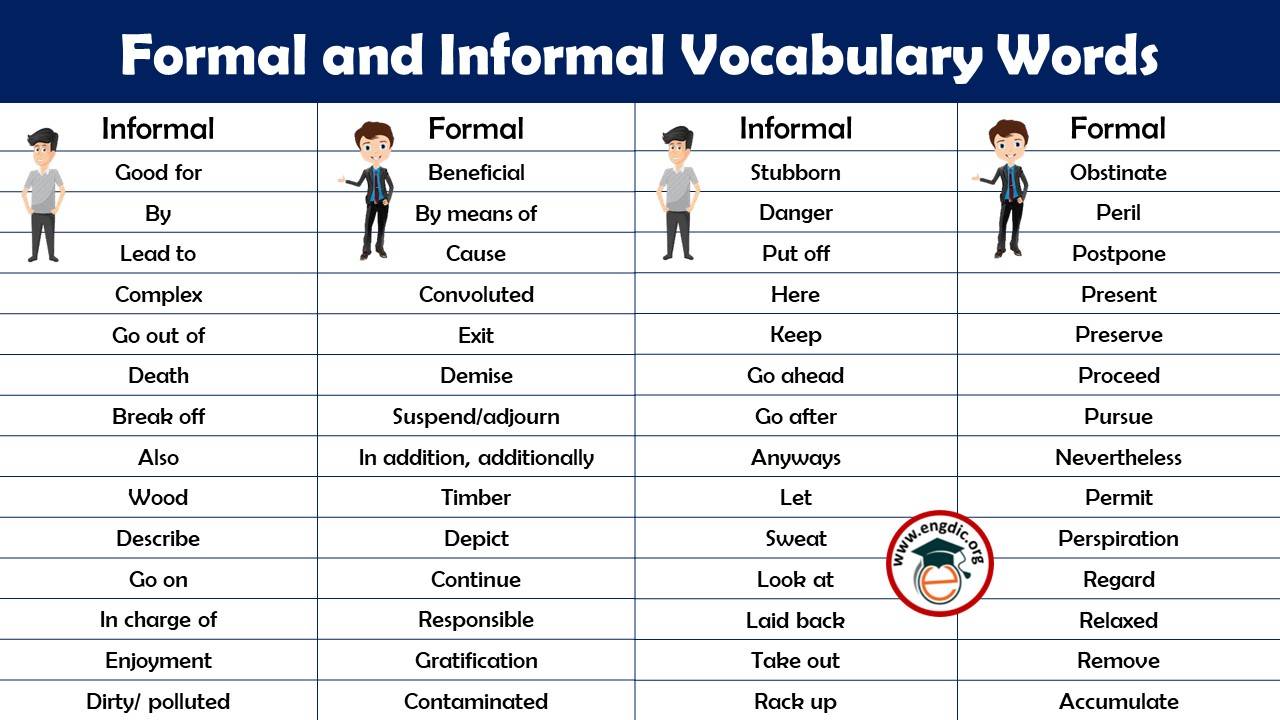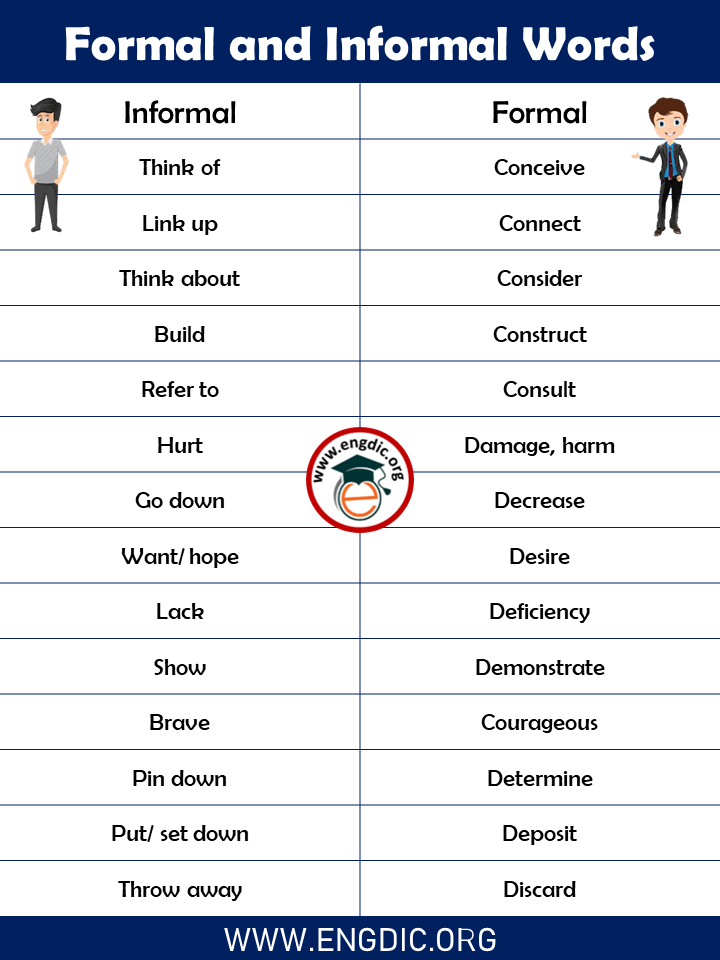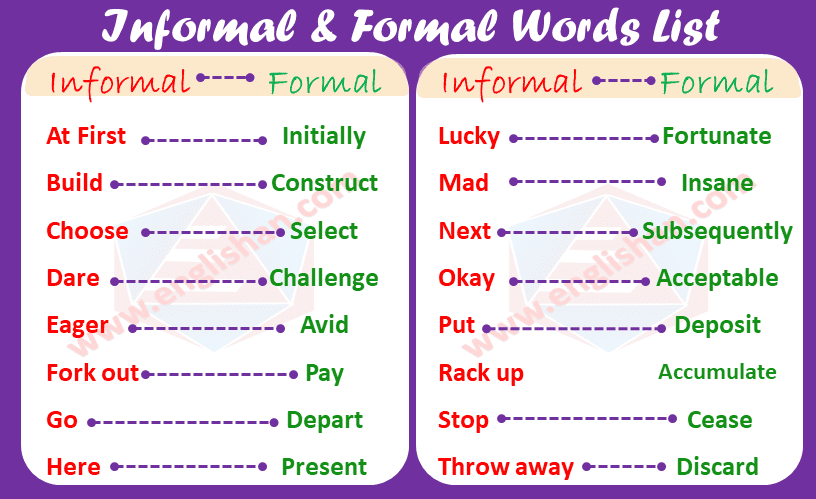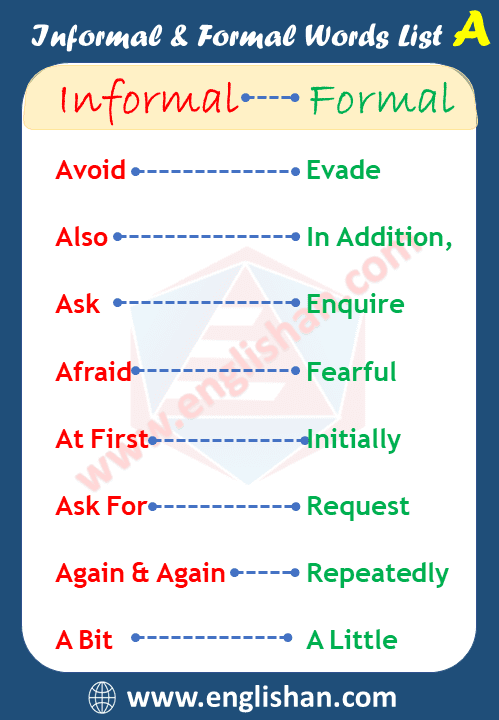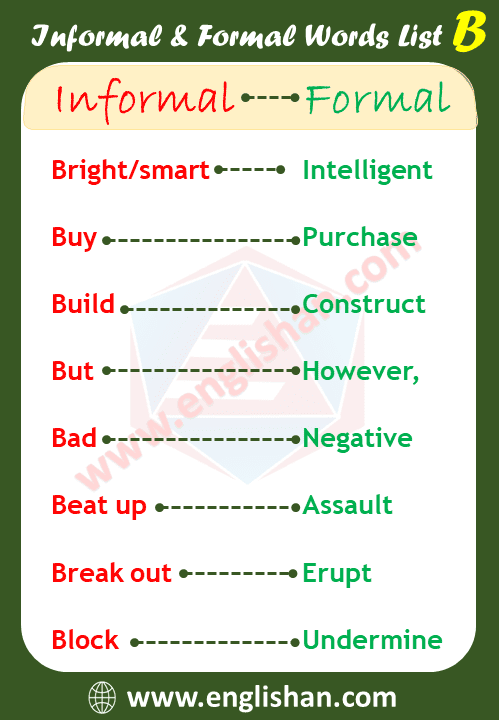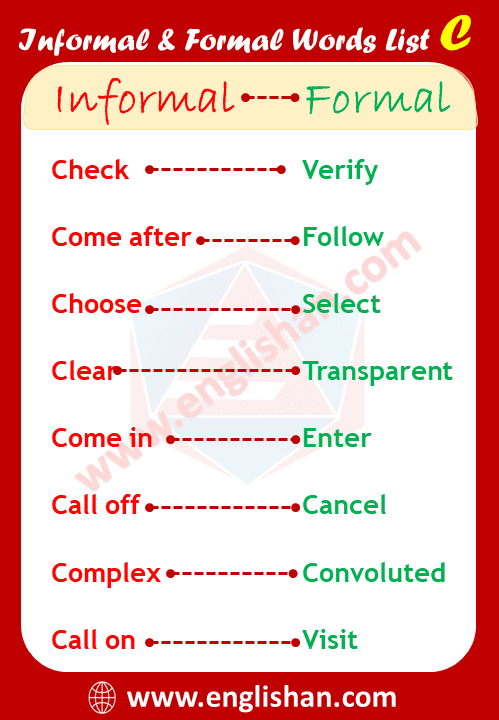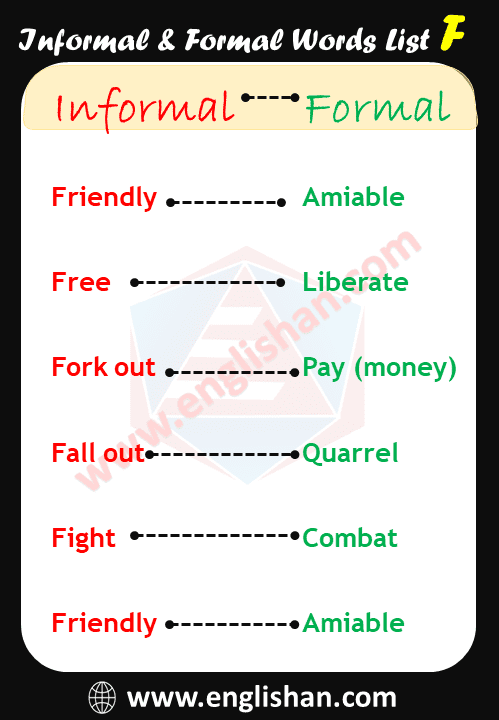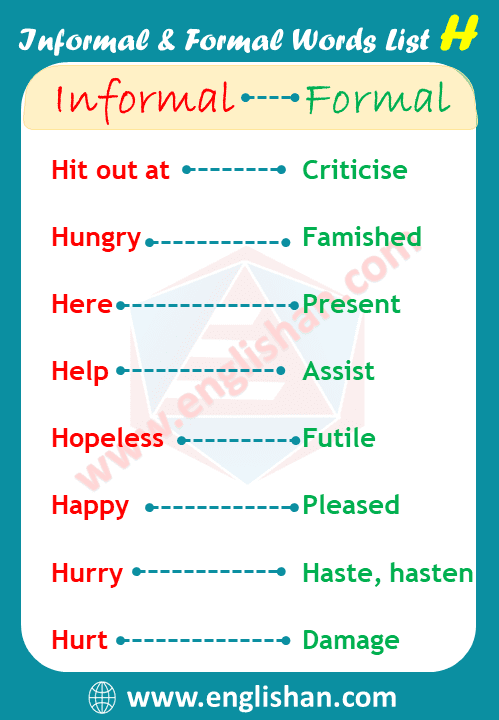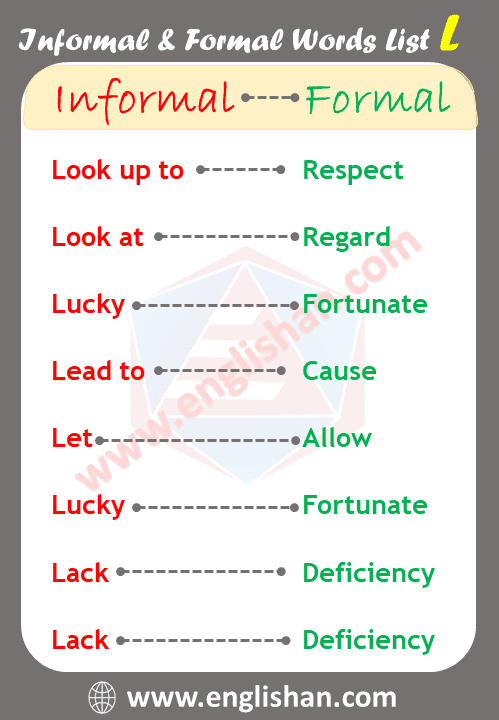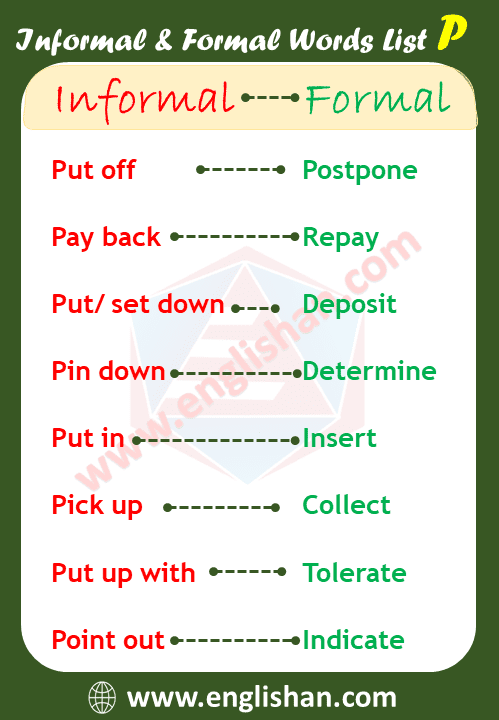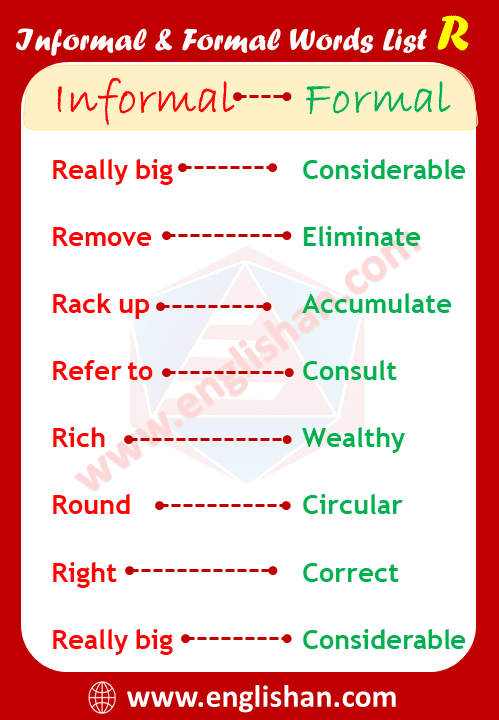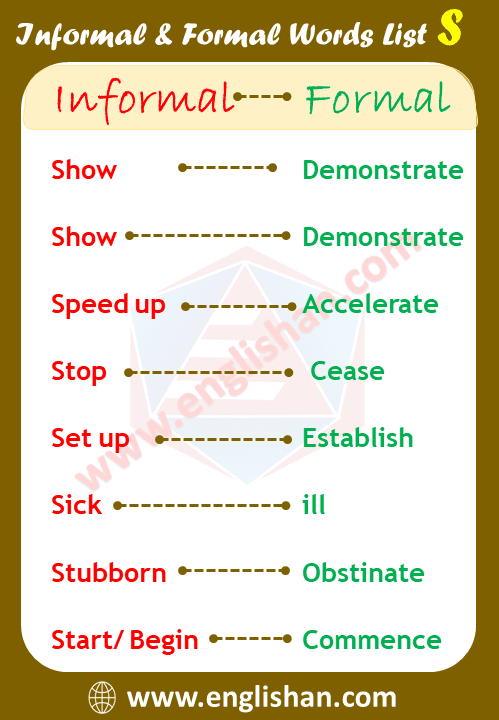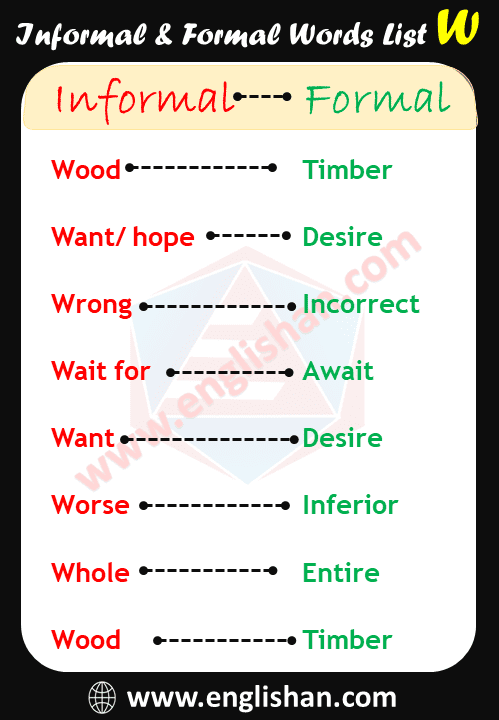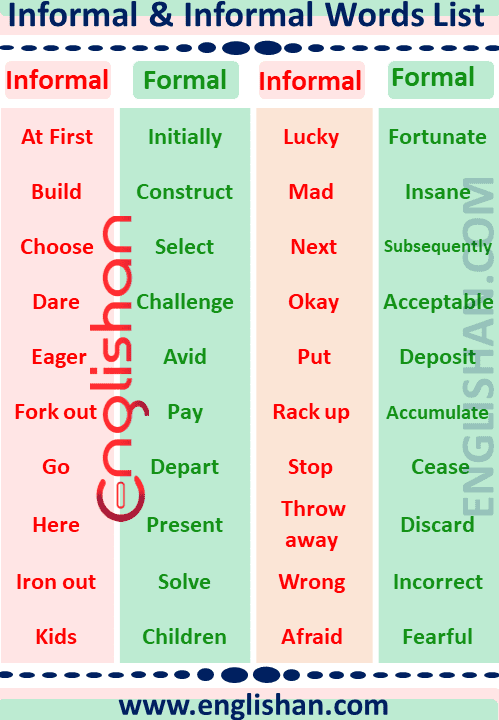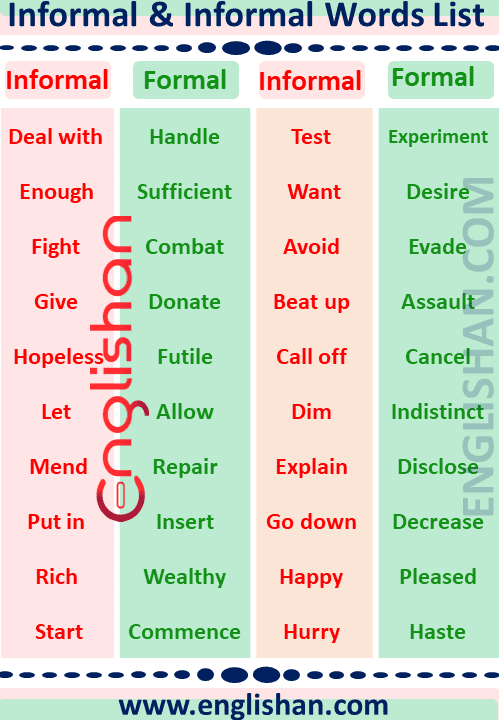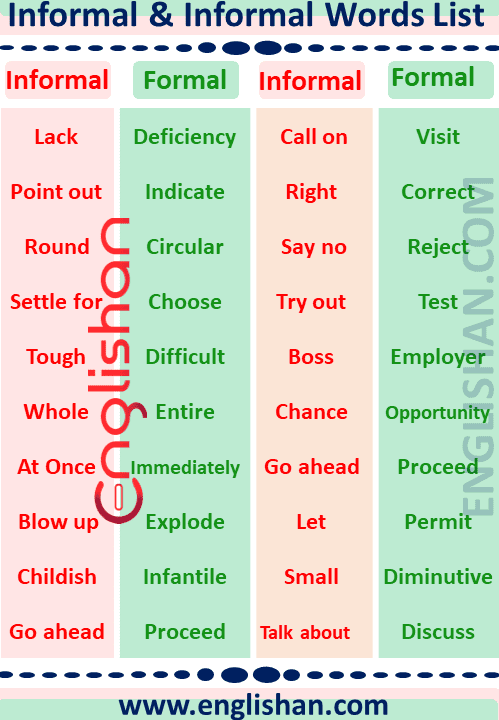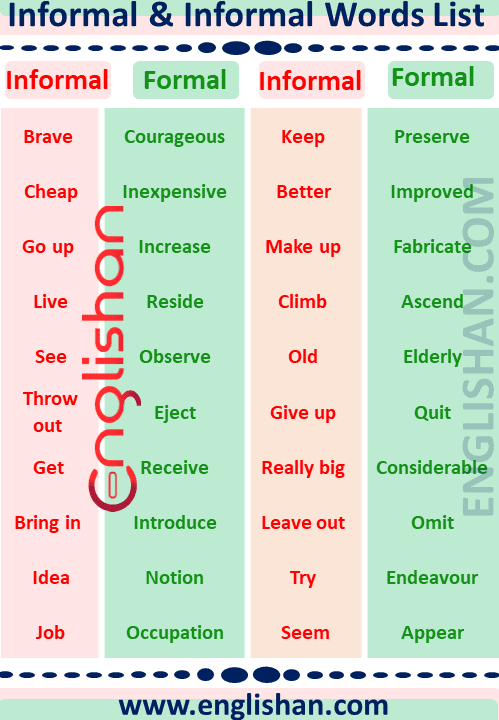
Formal English:
Formal Language is like a formal dress, in a formal language you have to be careful with words, you have to choose words with respect. We use it when writing essays for school, cover letters to apply for jobs, or emails and letters at work.
Informal English:
Informal Language is the language you speak in your friend’s circle. It is used in conversation with your family and friends, informal words are also respectful words, but they are less polite as compare to formal words.
Here are Formal and Informal words List in English
1. Verbs – Informal & Formal
| INFORMAL | FORMAL |
| a lot of | numerous |
| anyways | nevertheless |
| block | undermine |
| break down | fail/collapse |
| break up | disintegrate |
| bring in | introduce |
| can | is capable of |
| come back | return |
| come/go in | enter |
| deal with | handle |
| enjoyment | gratification |
| faithfulness | fidelity |
| find out | discover |
| from (company) | on the behalf of |
| get | obtain |
| get in touch with | contact |
| give in | yield |
| give the go-ahead | authorize |
| give/bring back | return |
| go against | oppose |
| go ahead | proceed |
| go away | leave/depart |
| go before | precede |
| go down | decrease |
| go out of | exit |
| go up | increase |
| hopeless | futile |
| house | residence |
| hungry | famished |
| it’s about | it concerns, it’s in regards to |
| keep | retain |
| keep up | maintain properly |
| lead to | cause |
| leave out | omit |
| let | permit |
| link up | connect |
| lively | energetic |
| look at | examine |
| look for | seek |
| look into | investigate |
| look like | resemble |
| lots of/ a lot of | much, many |
| make out | discern |
| makeup | fabricate |
| mend | repair |
| need to | required |
| plus/also | moreover/furthermore |
| point out | indicate |
| put in | insert |
| put off | postpone |
| put up | tolerate |
| put up with | tolerate |
| put/set down | deposit |
| rack up | accumulate |
| really big | considerable |
| refer to | consult |
| ring up | call |
| seem | appear |
| set out | display |
| set up | establish |
| settle for | choose |
| show | demonstrate, illustrate, portray |
| show up | arrive |
| speak to | address |
| stand for | represent |
| start | commence |
| take away | remove |
| take out | remove |
| talk about | discuss/consider |
| thanks | gratitude |
| think about | consider/ponder |
| think of | conceive |
| throw away | discard |
| throw out | eject |
| tired Formal and Informal words list in English Pdf | fatigued |
| tons of, heaps of | large quantities of, a number of |
| try out | test |
| wait for | await |
| whole | entire/complete |
| worse | inferior |
| say sorry | apologize, apologise |
2. Transitions – Informal & Formal
| Informal | Formal |
| Anyways | Nevertheless |
| Plus/Also | Moreover/ Furthermore |
| But | However |
| So | Therefore/Thus |
| Also | In addition, Additionally |
| ASAP | as soon as possible/at your earliest convenience |
| Okay, OK | acceptable |
| In the meantime | In the interim |
| I think | In my opinion, |
| In the end, | Finally |
| To sum up | In conclusion, |
| In a nutshell/Basically | To summarize, |
| Anyway, | Notwithstanding |
| All right | Acceptable |
| Well, | |
| To top it all off, | |
| On top of it all, | |
| In order to |
3. Emphasis Words – Informal & Formal
| Informal | Formal |
| lots of/ a lot of | much, many |
| tons of, heaps of | large quantities of, a number of |
| totally | completely, strongly |
| really, very | definitely |
4. Letter Expressions – Informal & Formal
| Informal | Formal |
| Hi Robert, | Dear Sir or Madam |
| Just wanted to let you know… | I am writing to inform you… |
| Love, | Yours sincerely, Yours faithfully, |
| Cheers, | |
| Yours Truly, Best regards, kind regards | |
| Hope to hear from you soon | I look forward to hearing from you |
| You can call me if you need anything | Please do not hesitate to contact me |
5. Abbreviations – Informal & Formal
| Informal | Formal |
| ASAP | as soon as possible |
| T.V. | television |
| photo | photograph |
| cell | cell phone |
| net | Internet |
6. Slang – Informal & Formal
| Informal | Formal |
| kids | children |
| bad | negative |
| good | positive |
| really big | considerable |
| right | correct |
| wrong | incorrect |
| smart | intelligent |
| cheap | inexpensive |
| loaded | rich |
Play Word coach Game: Click Here.
Download Word Coach Application
Read More:
Post Views: 71,880
It is extremely important to know when to use either formal or informal language. This will depend on the business you are working in, the industry you are in, the people you are speaking with, and the topic you are talking about. Learning the formal and informal way to speak is also a great way to master and learn the language.
Both formal and informal languages serve different individual purposes. The two styles vary depending on the tone you use, the words you choose to use, and the way you construct the words together. Using formal language is less personal than using informal language. Always remember that the type of language you decide to use in writing or speaking will solely depend on your purpose and the audience you are speaking to. Here are some tips you must remember to help you know when to use either formal or informal language.
Formal Language
As mentioned above, formal language is less personal than informal language. This is commonly used when writing or speaking for professional or academic purposes like emails for business, formal letters, academic write-ups, professional academic circumstances, presentations, reports, official and or legal documents, job interviews, and any scenario where formal language is appropriate. Since it is less personal, this can be used when you are communicating with a person you do not personally know well, like public speeches and tenders.
Note that very formal English in everyday situations may sound pompous at times, so always consider the context and the audience you are targeting. In situations that are more serious like job interviews or emailing your university professor, using formal language is highly encouraged. This can help you avoid sounding disrespectful and inappropriate and help you sound polite and professional instead. Remember that formal language has a more complex grammar where the sentences are generally phrased longer and use modal verbs. In pronunciation, speech is slower when using formal language and the tone should be serious.
Informal Language
Informal language is more casual and laid back. This is commonly used with people you know well as your family and friends. You usually use this when you are in a relaxed environment. When your agenda is to share your personal thoughts or you are telling a story, you should use language that is appropriate to the scenario. Informal language has a more conversational tone, frequently using personal pronouns, informal expressions, sentences are shorter, and the feelings are more personal.
This type of language is best suited to use when telling a story, personal narrations, and social forms like blogs and personal emails. This can also be used in advertising, spontaneous speeches, networking, or socializing with your clients, meetings with your teams, text messages, and everyday conversations with your family and friends you know well. Contractions are used in informal languages to ease the flow and make the speech faster. Abbreviations and acronyms are also used to shorten the words. Colloquial language is also used to allow the casual flow of conversation. You can even insert an emoji here and there when using informal language!
Examples of Differences between Formal and Informal Language
Here are some examples of formal and informal languages used below in terms of:
Contractions
Informal: It won’t turn on.
Formal: The device will not turn on.
Phrasal Verbs
Informal: I don’t want to drop out of school.
Formal: I have no intention of leaving the school.
Slang
Informal: Imma go hit him up.
Formal: I am going to contact him.
Collocations
Informal: My business is going bankrupt.
Formal: My business has now officially ceased to trade.
Acronyms
Informal: I will send the files asap.
Formal: I will send the files as soon as I can.
First-Person Pronouns
Informal: I think my study is very useful.
Formal: The researcher is certain that the research conducted serves a lot of purposes.
Formal language is commonly used when writing. Informal language is usually used when speaking. However, this is always not the case. Always refer to the situation you are in upon deciding when to use either formal or informal language. If you are ever uncertain about whether what type of language you should use in a conversation, especially when speaking to someone older than you are or in a work environment, pay close attention to how they talk to you and try to follow their lead. However, when you are emailing someone you do not know, it is best to use formal language to be respectful and polite to the person you are emailing to.
Formal vs. Informal Words/Phrases
Learn an extensive list of 400+ formal vs. informal words and phrases in English.
Ask >>——-<< Enquire
Ask for >>——-<< Request
Book >>——-<< Reserve
Check >>——-<< Verify
Get >>——-<< Receive
Help >>——-<< Assist
Need >>——-<< Request
Say sorry >>——-<< Apologise
Start/ Begin >>——-<< Commence
End >>——-<< Terminate/ Finish
Try >>——-<< Endeavour
Deal with >>——-<< Handle
Tell >>——-<< Inform
Wait for >>——-<< Await
Fight >>——-<< Combat
Use/Eat >>——-<< Consume
Go >>——-<< Depart
Tough >>——-<< Difficult
Small >>——-<< Diminutive
Explain >>——-<< Disclose
Set out >>——-<< Display
Throw out >>——-<< Eject
Old >>——-<< Elderly
Say >>——-<< Express
Afraid >>——-<< Fearful
In the end >>——-<< Finally
Lucky >>——-<< Fortunate
But >>——-<< However
Wrong >>——-<< Incorrect
Go up >>——-<< Increase
Cheap >>——-<< Inexpensive
At first >>——-<< Initially
Mad >>——-<< Insane
Formal Words vs. Informal Words in English | Image 1

Bright/smart >>——-<< Intelligent
Big/Large >>——-<< Enormous
Right >>——-<< Correct
A bit >>——-<< A little
Away >>——-<< Absent
Speed up >>——-<< Accelerate
Okay, ok >>——-<< Acceptable
Help >>——-<< Aid/ Assist
Let >>——-<< Allow
Call off >>——-<< Cancel
Friendly >>——-<< Amiable
Expect >>——-<< Anticipate
Seem >>——-<< Appear
Climb >>——-<< Ascend
Beat up >>——-<< Assault
Fall out >>——-<< Quarrel
Eager >>——-<< Avid
Stop >>——-<< Cease
Dare >>——-<< Challenge
Kids >>——-<< Children
Settle for >>——-<< Choose
Round >>——-<< Circular
Pick up >>——-<< Collect
Think of >>——-<< Conceive
Link up >>——-<< Connect
Think about >>——-<< Consider
Build >>——-<< Construct
Refer to >>——-<< Consult
Hurt >>——-<< Damage, harm
Go down >>——-<< Decrease
Want/ hope >>——-<< Desire
Lack >>——-<< Deficiency
Show >>——-<< Demonstrate
Brave >>——-<< Courageous
Pin down >>——-<< Determine
Put/ set down >>——-<< Deposit
Throw away >>——-<< Discard
Make out >>——-<< Discern
Talk about >>——-<< Discuss/consider
Give out >>——-<< Distribute
Give >>——-<< Donate
Remove >>——-<< Eliminate
Imagine >>——-<< Envisage
Break out >>——-<< Erupt
Get out >>——-<< Escape
Avoid >>——-<< Evade
Go through >>——-<< Examine
Make up >>——-<< Fabricate
Test >>——-<< Experiment
Ease >>——-<< Facilitate
Come after >>——-<< Follow
Sick >>——-<< Ill
Ask out >>——-<< Invite
Go away >>——-<< Leave/ depart
At once >>——-<< Immediately
Free >>——-<< Liberate
Deal with >>——-<< Manage
Bad >>——-<< Negative
Look into >>——-<< Investigate
Chance >>——-<< Opportunity
See >>——-<< Perceive
Happy >>——-<< Pleased
Give up >>——-<< Quit
Older >>——-<< Senior
Use >>——-<< Utilize
Enough >>——-<< Sufficient
End >>——-<< Terminate
Empty >>——-<< Vacant
Rich >>——-<< Wealthy
Mend >>——-<< Repair
Idea >>——-<< Notion
Mainly >>——-<< Principally
See >>——-<< Observe
Leave out >>——-<< Omit
Go against >>——-<< Oppose
Formal Words vs. Informal Words in English | Image 2

Hungry >>——-<< Famished
Childish >>——-<< Immature
Maybe >>——-<< Perhaps
Good >>——-<< Positive
Give >>——-<< Provide
Buy >>——-<< Purchase
Say no >>——-<< Reject
Free >>——-<< Release
Look for >>——-<< Seek
Choose >>——-<< Select
Get by >>——-<< Survive
So >>——-<< Therefore
Put up with >>——-<< Tolerate
Block >>——-<< Undermine
Catch up >>——-<< Understand
Sight >>——-<< Vision
Young >>——-<< Youthful
Get >>——-<< Obtain
Need >>——-<< Require
Pay back >>——-<< Repay
Live >>——-<< Reside
Point out >>——-<< Indicate
Find out >>——-<< Learn/Discover
Get away >>——-<< Elude
Come in >>——-<< Enter
Lively >>——-<< Energetic
Clear >>——-<< Transparent
Whole >>——-<< Entire/Complete
Blow up >>——-<< Explode
Break down >>——-<< Fail/Collapse
Hopeless >>——-<< Futile
Hit out at >>——-<< Criticise
Tired >>——-<< Exhausted/ Fatigued
Clothes >>——-<< Garment
Go before >>——-<< Precede
Thanks >>——-<< Gratitude
Hurry >>——-<< Haste, hasten
Funny >>——-<< Humorous, amusing
Better >>——-<< Improved
Dim >>——-<< Indistinct
Worse >>——-<< Inferior
Put in >>——-<< Insert
Bring in >>——-<< Introduce
Make up >>——-<< Invent
Kidding >>——-<< Jesting
Naked >>——-<< Nude
Childish >>——-<< Infantile
A lot of >>——-<< Numerous
Stubborn >>——-<< Obstinate
Danger >>——-<< Peril
Put off >>——-<< Postpone
Here >>——-<< Present
Keep >>——-<< Preserve
Go ahead >>——-<< Proceed
Go after >>——-<< Pursue
Anyways >>——-<< Nevertheless
Let >>——-<< Permit
Sweat >>——-<< Perspiration
Look at >>——-<< Regard
Laid back >>——-<< Relaxed
Take out >>——-<< Remove
Rack up >>——-<< Accumulate
Over >>——-<< At an end
Good looking >>——-<< Attractive
Good for >>——-<< Beneficial
By >>——-<< By means of
Lead to >>——-<< Cause
Complex >>——-<< Convoluted
Go out of >>——-<< Exit
Death >>——-<< Demise
Break off >>——-<< Suspend/adjourn
Also >>——-<< In addition, additionally
Wood >>——-<< Timber
Describe >>——-<< Depict
Go on >>——-<< Continue
In charge of >>——-<< Responsible
Enjoyment >>——-<< Gratification
Dirty/ polluted >>——-<< Contaminated
Again & again >>——-<< Repeatedly
Marvelous >>——-<< Exceptional
Really big >>——-<< Considerable
Can >>——-<< Is capable of
Fork out >>——-<< Pay (money)
Talk into >>——-<< Persuade
Come up to >>——-<< Reach/attain
Iron out >>——-<< Solve/overcome (a problem/difficulty)
Next/later >>——-<< Subsequently
Try out >>——-<< Test
Call on >>——-<< Visit
Drop out of >>——-<< Withdraw (from)
Look up to >>——-<< Respect
Look like >>——-<< Resemble
Job >>——-<< Occupation
Dad >>——-<< Father
Boss >>——-<< Employer
Formal and Informal Words | Images
Formal Words & Informal Words in English | Image 3

List of Formal Words & Informal Words in English | Image 4

Useful Formal Words & Informal Words in English | Image 5

Formal Words & Informal Words in English | Image 6

Formal vs. Informal Words Video
Last Updated on September 27, 2022
Formal and Informal words list in English Pdf!
What are formal and informal Words?
Formal Language is like formal dress, in the formal language you have to be careful with words, and you have to choose words with respect. You cannot use the word ‘Ask’ in formal language because it is an informal word. You have to be a bit polite in formal language and vocabulary words, rather you can use ‘Inquire’ which is more formal than ‘ask’.
Informal Language is the language you speak with your friend’s circle. It is used in conversation with your family and friends, informal words are also respectful words, but they are less polite as compared to formal words.
Related: List of Formal Words in English
Formal and Informal words list in English
Here is the list of common 1000 Formal and Informal Words:
Informal –> Formal
- Ask –> Enquire
- Ask for –> Request
- Book –> Reserve
- Check –> Verify
- Get –> Receive
- Help –> Assist
- Need –> Request
- Say sorry –> Apologies
- Start/ Begin –> Commence
- End –> Terminate/ Finish
- Try –> Endeavour
- Deal with –> Handle
- Tell –> Inform
- Wait for –> Await
- Fight –> Combat
- Use/Eat –> Consume
- Go –> Depart
- Tough –> Difficult
- Small –> Diminutive
- Explain –> Disclose
- Set out –> Display
- Throw out –> Eject
- Old –> Elderly
- Say –> Express
- Afraid –> Fearful
- In the end –> Finally
- Lucky –> Fortunate
- But –> However
- Wrong –> Incorrect
- Go up –> Increase
- Cheap –> Inexpensive
- At first –> Initially
- Mad –> Insane
- Bright/smart –> Intelligent
- Big/Large –> Enormous
- Right –> Correct
- A bit –> A little
- Away –> Absent
- Speed up –> Accelerate
- Okay, ok –> Acceptable
- Help –> Aid/ Assist
- Let –> Allow
- Call off –> Cancel
- Friendly –> Amiable
Formal Informal Words Image 1
- Expect –> Anticipate
- Seem –> Appear
- Climb –> Ascend
- Beat up –> Assault
- Fall out –> Quarrel
- Eager –> Avid
- Stop –> Cease
- Dare –> Challenge
- Kids –> Children
- Settle for –> Choose
- Round –> Circular
- Pick up –> Collect
- Think of –> Conceive
- Link up –> Connect
- Think about –> Consider
- Build –> Construct
- Refer to –> Consult
- Hurt –> Damage, harm
- Go down –> Decrease
- Want/ hope –> Desire
- Lack –> Deficiency
- Show –> Demonstrate
- Brave –> Courageous
- Pin down –> Determine
- Put/ set down –> Deposit
- Throw away –> Discard
- Make out –> Discern
- Talk about –> Discuss/consider
- Give out –> Distribute
- Give –> Donate
- Remove –> Eliminate
- Imagine –> Envisage
- Break out –> Erupt
- Get out –> Escape
- Avoid –> Evade
- Go through –> Examine
- Make up –> Fabricate
- Test –> Experiment
- Ease –> Facilitate
- Come after –> Follow
- Sick –> Ill
- Ask out –> Invite
- Go away –> Leave/ depart
- At once –> Immediately
- Free –> Liberate
- Deal with –> Manage
- Bad –> Negative
- Look into –> Investigate
- Chance –> Opportunity
- See –> Perceive
- Happy –> Pleased
- Give up –> Quit
- Older –> Senior
- Use –> Utilize
- Enough –> Sufficient
- End –> Terminate
- Empty –> Vacant
- Rich –> Wealthy
- Mend –> Repair
- Idea –> Notion
Formal Informal Words Image 2
- Mainly –> Principally
- See –> Observe
- Leave out –> Omit
- Go against –> Oppose
- Hungry –> Famished
- Childish –> Immature
- Maybe –> Perhaps
- Good –> Positive
- Give –> Provide
- Buy –> Purchase
- Say no –> Reject
- Free –> Release
- Look for –> Seek
- Choose –> Select
- Get by –> Survive
- So –> Therefore
- Put up with –> Tolerate
- Block –> Undermine
- Catch up –> Understand
- Sight –> Vision
- Young –> Youthful
- Get –> Obtain
- Need –> Require
- Pay back –> Repay
- Live –> Reside
- Point out –> Indicate
- Find out –> Learn/Discover
- Get away –> Elude
- Come in –> Enter
- Lively –> Energetic
- Clear –> Transparent
- Whole –> Entire/Complete
- Blow up –> Explode
- Break down –> Fail/Collapse
- Hopeless –> Futile
- Hit out at –> Criticise
- Tired –> Exhausted/ Fatigued
- Clothes –> Garment
- Go before –> Precede
- Thanks –> Gratitude
- Hurry –> Haste, hasten
- Funny –> Humorous, amusing
- Better –> Improved
- Dim –> Indistinct
- Worse –> Inferior
- Put in –> Insert
- Bring in –> Introduce
- Make up –> Invent
- Kidding –> Jesting
- Naked –> Nude
- Childish –> Infantile
- A lot of –> Numerous
- Stubborn –> Obstinate
- Danger –> Peril
- Put off –> Postpone
- Here –> Present
- Keep –> Preserve
- Go ahead –> Proceed
- Go after –> Pursue
- Anyways –> Nevertheless
- Let –> Permit
- Sweat –> Perspiration
- Look at –> Regard
- Laid back –> Relaxed
- Take out –> Remove
- Rack up –> Accumulate
- Over –> At an end
Informal Formal Words Image 3
- Good looking –> Attractive
- Good for –> Beneficial
- By –> By means of
- Lead to –> Cause
- Complex –> Convoluted
- Go out of –> Exit
- Death –> Demise
- Break off –> Suspend/adjourn
- Also –> In addition, additionally
- Wood –> Timber
- Describe –> Depict
- Go on –> Continue
- In charge of –> Responsible
- Enjoyment –> Gratification
- Dirty/ polluted –> Contaminated
- Again & again –> Repeatedly
- Marvelous –> Exceptional
- Really big –> Considerable
- Can –> Is capable of
- Fork out –> Pay (money)
- Talk into –> Persuade
- Come up to –> Reach/attain
- Iron out –> Solve/overcome
- Next/later –> Subsequently
- Try out –> Test
- Call on –> Visit
- Drop out of –> Withdraw (from)
- Look up to –> Respect
- Look like –> Resemble
- Job –> Occupation
- Dad –> Father
- Boss –> Employer
- Avoid –> Evade
- Also In –> Addition,
- Ask –> Enquire
- Afraid –> Fearful
- At First –> Initially
- Ask For –> Request
- Again & Again –> Repeatedly
- A Bit –> A Little
- Avoid –> Evade
- Anyway –> Nevertheless
- Ask Out –> Invite
- Away –> Absent
- At Once –> Immediately
- A Lot Of –> Numerous
Informal Formal Vocabulary Image 4
- Bright/smart –> Intelligent
- Buy –> Purchase
- Build –> Construct
- But –> However
- Bad –> Negative
- Beat up –> Assault
- Break out –> Erupt
- Block –> Undermine
- Blow up –> Explode
- Boss –> Employer
- Brave –> Courageous
- Better –> Improved
- Big/Large –> Enormous
- Bring in –> Introduce
- Break off –> Suspend/adjourn
- Break down –> Fail/Collapse
- Check –> Verify
- Come after –> Follow
- Choose –> Select
- Clear –> Transparent
- Come in –> Enter
- Call off –> Cancel
- Complex –> Convoluted
- Call on –> Visit
- Childish –> Infantile
- Chance –> Opportunity
- Cheap –> Inexpensive
- Can Is –> capable of
- Come up –> to Reach/attain
- Climb –> Ascend
- Clothes –> Garment
- Dirty/ polluted –> Contaminated
- Danger –> Peril
- Dare –> Challenge
- Dad –> Father
- Describe –> Depict
- Deal with –> Handle
- Dim –> Indistinct
- Death –> Demise
- Deal –> with Manage
- Drop out –> of Withdraw (from)
- End –> Terminate/ Finish
- Ease –> Facilitate
- Eager –> Avid
- Expect –> Anticipate
- Enough –> Sufficient
- Explain –> Disclose
- End –> Terminate
- Empty –> Vacant
- Enjoyment –> Gratification
Formal Informal Words Image 5
- friendly –> Amiable
- Free –> Liberate
- Fork out –> Pay (money)
- Fall out –> Quarrel
- Fight –> Combat
- Get –> Receive
- Get out –> Escape
- Go –> Depart
- Go before –> Precede
- Go after –> Pursue
- Good looking –> Attractive
- Give –> Donate
- Go down –> Decrease
- Go through –> Examine
- Good for –> Beneficial
- Go ahead –> Proceed
- Go up –> Increase
- Go on –> Continue
- Go out of –> Exit
- Give up –> Quit
- Get away –> Elude
- Go away –> Leave/ depart
- Give out –> Distribute
- Go against –> Oppose
- Get –> Obtain
- Good –> Positive
- Get by –> Survive
Related: Formal and Informal Words List for IELTS
- Hit out at –> Criticise
- Hungry –> Famished
- Here –> Present
- Help –> Assist
- Hopeless –> Futile
- Happy –> Pleased
- Hurry –> Haste, hasten
- Hurt –> Damage
- Idea –> Notion
- Imagine –> Envisage
- In charge of –> Responsible
- Iron out –> Solve/overcome
- Job –> Occupation
- Keep –> Preserve
- Kidding –> Jesting
- Kids –> Children
- Look up to –> Respect
- Look at –> Regard
- Lucky –> Fortunate
- Lead to –> Cause
- Let –> Allow
- Lucky –> Fortunate
- Lack –> Deficiency
- Look for –> Seek
- Let –> Permit
- Live –> Reside
- Leave out –> Omit
- Look like –> Resemble
- Lively –> Energetic
- Laid back –> Relaxed
- Live –> Reside
- Look into –> Investigate
- Make up –> Fabricate
- Mainly –> Principally
- Mad –> Insane
- Maybe –> Perhaps
- Mend –> Repair
- Marvelous –> Exceptional
- Need –> Require
- Naked –> Nude
- Next/later –> Subsequently
- Old –> Elderly
- Over At an –> end
- Okay, ok –> Acceptable
- Older –> Senior
- Put off –> Postpone
- Pay back –> Repay
- Put/ set down –> Deposit
- Pin down –> Determine
- Put in –> Insert
- Pick up –> Collect
- Put up with –> Tolerate
- Point out –> Indicate
Related: Formal and Informal Vocabulary Examples
Informal Formal Vocabulary Image 6
- Really big –> Considerable
- Remove –> Eliminate
- Rack up –> Accumulate
- Refer to –> Consult
- Rich –> Wealthy
- Round –> Circular
- Right –> Correct
- Show –> Demonstrate
- Speed up –> Accelerate
- Stop –> Cease
- Set up –> Establish
- Sick –> ill
- Stubborn –> Obstinate
- Start/ Begin –> Commence
- Shorten –> Decrease
- Settle for –> Choose
- Say no –> Reject
- Small –> Diminutive
- See –> Observe
- So –> Therefore
- Sight –> Vision
- Seem –> Appear
- Set out –> Display
- Seem –> Appear
- Sweat –> Perspiration
- Say sorry –> Apologise
- Say –> Express
- Talk into –> Persuade
- Tired –> Exhausted/ Fatigued
- Throw away –> Discard
- Take out –> Remove
- Test –> Experiment
- Thanks –> Gratitude
- Tough –> Difficult
- Try out –> Test
- Talk about –> Discuss/consider
- Throw –> out Eject
- Think of –> Conceive
- Try –> Endeavour
- Think about –> Consider
- Tell –> Inform
- Use –> Utilize
- Wood –> Timber
- Want/ hope –> Desire
- Wrong –> Incorrect
- Wait for –> Await
- Want –> Desire
- Worse –> Inferior
- Whole –> Entire/Complete
- Young –> Youthful
Must Learn: 200 synonyms words list
Infographics (Formal and Informal words list in English )


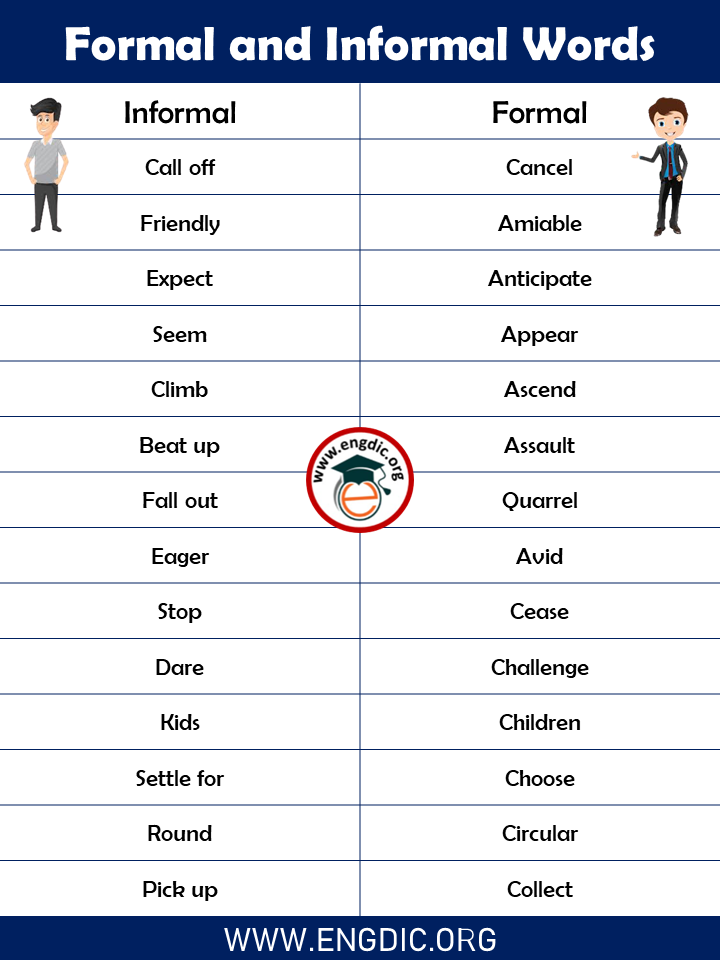
Download this lesson on Formal and Informal words list in English in PDF
Download PDF
About The Author
Every English learner needs to learn Formal and Informal words and the situations these words are suitable to use in. We have compiled a huge list of formal and informal words that can help learners differentiate easily.
First thing first, let’s try understand what is a formal and informal word. Formal words are used in official communication in both oral or written. You are a student and you definitely talk to your teachers, your teachers would appreciate if you communicate formally with them. The same is the matter with a boss or anybody in the world with whom you are not frank enough. Let’s take a few examples
you want to write a letter to your teacher to explain why were you absent last day. You have two words ‘away’ and ‘absent’ , in formal situations we definitely have to choose absent but yes if you are talking to your classmate, you can tell him why were you away last day.
Informal words shouldn’t be used with your teachers, boss and the people you are not frank with. You can comfortably use these words with everybody you are frank with, in short.
Avoid———–Evade
Also In ————Addition,
Ask –————––Enquire
Afraid-———— Fearful
At First————- Initially
Ask For————- Request
Again & Again ————-Repeatedly
A Bit ————-A Little
Avoid————- Evade
Anyway ————-Nevertheless
Ask Out————- Invite
Away ————-Absent
At Once ————-Immediately
A Lot Of ————-Numerous
Bright/smart————- Intelligent
Buy ————-Purchase
Build ————-Construct
But ————-However,
Bad ————-Negative
Beat up————- Assault
Break out ————-Erupt
Block ————-Undermine
Blow up————- Explode
Boss ————-Employer
Brave————- Courageous
Better————- Improved
Big/Large————- Enormous
Bring in————- Introduce
Break off ————-Suspend/adjourn
Break down————- Fail/Collapse
Check ————-Verify
Come after ————-Follow
Choose————- Select
Clear ————-Transparent
Come in ————-Enter
Call off –————Cancel
Complex ————-Convoluted
Call on–———— Visit
Childish ————-Infantile
Chance————- Opportunity
Cheap ————-Inexpensive
Can Is ————-capable of
Come up ————-to Reach/attain
Climb–———— Ascend
Clothes ————-Garment
Dirty/ polluted ————-Contaminated
Danger ————-Peril
Dare ————-Challenge
Dad ————-Father
Describe————- Depict
Deal with————- Handle
Dim ————-Indistinct
Death————- Demise
Deal ————-with Manage
Drop out ————-of Withdraw (from)
End ————-Terminate/ Finish
Ease –————Facilitate
Eager————- Avid
Expect ————-Anticipate
Enough ————-Sufficient
Explain ————-Disclose
End ————-Terminate
Empty ————-Vacant
Enjoyment ————-Gratification
Friendly ————-Amiable
Free ————-Liberate
Fork out ————-Pay (money)
Fall out————- Quarrel
Fight ————-Combat
Get ————-Receive
Get out ————-Escape
Go ————-Depart
Go before————- Precede
Go after –————Pursue
Good looking ————-Attractive
Give————- Donate
Go down ————-Decrease
Go through————- Examine
Good for————- Beneficial
Go ahead ————-Proceed
Go up ————-Increase
Go on ————-Continue
Go out of ————-Exit
Give up————- Quit
Get away————- Elude
Go away————- Leave/ depart
Give out————- Distribute
Go against–———— Oppose
Get ————-Obtain
Good ————-Positive
Get by————- Survive
Hit out at ————-Criticise
Hungry————- Famished
Here ————-Present
Help————- Assist
Hopeless————- Futile
Happy ————-Pleased
Hurry –————Haste, hasten
Hurt ————-Damage
Idea ————-Notion
Imagine–———— Envisage
In charge of–———— Responsible
Iron out ————-Solve/overcome
Job ————-Occupation
Keep————- Preserve
Kidding ————-Jesting
Kids ————-Children
Look up to————- Respect
Look at————- Regard
Lucky ————-Fortunate
Lead to————- Cause
Let ————-Allow
Lucky————- Fortunate
Lack ————-Deficiency
Look for ————-Seek
Let ————-Permit
Live————- Reside
Leave out –———––Omit
Look like————- Resemble
Lively ————-Energetic
Laid back–———— Relaxed
Live ————-Reside
Look into————- Investigate
Make up————- Fabricate
Mainly————- Principally
Mad ————-Insane
Maybe ————-Perhaps
Mend ————–Repair
Marvelous————- Exceptional
Need ————-Require
Naked ————-Nude
Next/later ————-Subsequently
Old ————-Elderly
Over At an ————-end
Okay, ok————- Acceptable
Older————- Senior
Put off ————-Postpone
Pay back————- Repay
Put/ set down————- Deposit
Pin down————- Determine
Put in ————-Insert
Pick up ————-Collect
Put up with ————-Tolerate
Point out ————-Indicate
Really big————- Considerable
Remove ————-Eliminate
Rack up————- Accumulate
Refer to ————-Consult
Rich ————-Wealthy
Round ————-Circular
Right ————-Correct
Show ————-Demonstrate
Speed up ————-Accelerate
Stop ————-Cease
Set up ————-Establish
Sick————- ill
Stubborn ————-Obstinate
Start/ Begin ————–Commence
Shorten ————-Decrease
Settle for ————-Choose
Say no————- Reject
Small————- Diminutive
See————- Observe
So————- Therefore
Sight————- Vision
Seem ————-Appear
Set out –————Display
Seem ————-Appear
Sweat ————-Perspiration
Say sorry————- Apologise
Say ————-Express
Talk into ————-Persuade
Tired–———— Exhausted/ Fatigued
Throw away ————-Discard
Take out————- Remove
Test ————-Experiment
Thanks ————-Gratitude
Tough ————-Difficult
Try out ————-Test
Talk about ————-Discuss/consider
Throw ————out Eject
Think of ————- Conceive
Try ————-Endeavour
Think about————- Consider
Tell ————-Inform
Use ————-Utilize
Wood ————-Timber
Want/ hope————- Desire
Wrong————- Incorrect
Wait for ————-Await
Want ————-Desire
Worse ————-Inferior
Whole————- Entire/Complete
Young–———— Youthful
GET PDF
Difference Between Formal and Informal WordsFormal and Informal Words in WritingFormal and Informal Words PDFInformal To Formal ConverterInformal Words DictionaryInformal Words MeaningList of Formal Words for Academic WritingList of Formal Words for Academic Writing Pdf
Informal vocab-y is used in
one’s immediate circle: family, relatives or friends. Inf style is
free-and-easy, familiar and unpretentious. Inf words and word-groups
are traditionally divided into 3 types: colloquial,
slang and
dialect
words and word-groups.
Colloquialisms
are
used by everybody, and their sphere of communication is comparatively
wide, at least of literary
colloquial words. These
are inf words that are used in everyday conversational speech both by
cultivated and uneducated people of all age groups. Inf
words appear in dialogues in which they realistically reflect the
speech of modern people.
Pal and
chum
—friend;
girl, when
used coll-lly, denotes a woman of any age; bite
and snack
stand for
meal; hi,
hello are
inf greetings. A number of shortenings are found among words of this
type. pram,
exam, fridge, flu, prop, movie.Verbs
with post-positional adverbs are also numerous among coll-s: put
up, put over, make up, make out, turn in.
Literary coll-l words
are to be distinguished from familiar coll-l and low coll-l. The
borderline is not always clearly marked. familiar coll-l used mostly
by the young and the semi-educated. Low coll-l- uncultivated speech.
Slang-lang-ge
of a highly coll-l style, considered as below the level of standard
educated speech, and consisting either of new words or of current
words employed in some special sense. Each slang is rooted in a joke,
but not in a kind or amusing joke. This is the criterion for
distinguishing slang from coll-s: most slang words are metaphors
often with a coarse, mocking, cynical colouring. used by the young
and uneducated. (mug-face,dogs-feet, blinkers-eyes)
Gene ral slang
includes words that are not specific for any social or professional
group, whereas spec ial slang is peculiar for some such group:
teenager slang, university slang, public school slang, Air Force
siang, football slang, sea slang, and so on.
Dialect-a
variety of a language which prevails in a district, with local
peculiarities of vocabulary, pronunciation and phrase. So dialects
are regional forms of English. brass
-money;to
lake-to
play; nivver
–never,
summat-something;
nowt-nothing;
mich-much;тип—must;
ay-
yes.
Western and Southern. Every group has 4 or
5dialects.
Cockney — Southern dialect (London). It
exists in 2 levels: as spoken by educated and uneducated people.
Features of Cockney dialect Interchange between [W] and [V]: [vel]
— [wel] — well
The voiceless and voiced dental spirants: [O] —
[f] fing — thing; [ ] — [v] faver — father.
Formal
Style
-
Learned
words.
They are associated with printed pages.
Sphere of usage; they are used by educated and
highly educated people.
They are subdivided into:
Scientific prose — identified by their dry
flavour: comprise, compile, homogeneous.
Officialese — words of the official,
bueurocratic language. They should be avoided in speech: to
assist — to help, to proceed — to go, approximately — about.
Literary words — described as refined, they
are used in descriptive passages of fiction. They are represented by
the words of Roman languages and though fully adopted to English
phonetic system still sound foreign: solitude, sentiment,
fascination, cordial, allusive.
Modes of poetic diction — they are lofty,
high-flown, archaic, coloured, used only in poetry: alas,
constancy — верность, duth —
do.
Archaic and Obsolete
Words
rchaisms, obsolete words and historisms, their
general characteristics.
Obsolete words — are no longer in use,
especially out of use for at least a century. Archaic words —
are current in earlier times, but rare in present usage. Historisms
— are words denoting objects and phenomena, which are thing of
the past and no longer exist.
Features:
They stand close to the learned words (modes of
poetic dictions)
Archaisms are associated with printed pages.
They are moribund, are out of circulation,
rejected by living lang. and are not used in conversational
situations.
They are met in historical novels and poetry. They
are used to create a particular period of time.
Sometimes archaic words may undergo a sudden
reveal: kin used to be archaic word.
E.g.: thou — you, thy — your, nay -no, aye-
yes.
Соседние файлы в предмете [НЕСОРТИРОВАННОЕ]
- #
- #
- #
- #
- #
- #
- #
- #
- #
- #
- #

